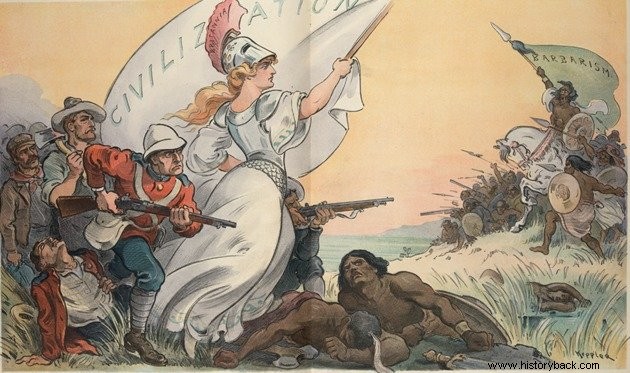Colonialism or colonization was the occupation of territories in America and on the African coast by Portugal, Spain, England and France, in the 14th and 15th centuries.
Imperialism is a concept created by Lenin to characterize the territorial expansion of some countries on the European continent, the United States and Japan to territories in America, Africa and Asia, in the 19th and 20th centuries.
Imperialism
The main idea of imperialism – a people or nation that dominates another territory – has existed since the most remote times.
Since antiquity, civilizations with more resources sought to invade other people's lands in order to guarantee labor, raw materials and passage for their armies.
We can cite the Egyptian Empire and the Roman Empire as examples.
Imperialism in the 19th Century

The concept of imperialism that we explain here is the one created by Lenin (1870-1924) in his work “Imperialism:Higher Stage of Capitalism” , from 1917.
In this book, he analyzed the modern domination of industrialized European countries over African and Asian territories.
According to Lenin, imperialism was a consequence of industrial growth. The countries produced so much that the internal market was reduced and it was necessary to look for other places to sell the surplus.
It was also necessary to find suppliers of raw materials for industries that required more and more resources.
Likewise, the number of unemployed increased with technological progress and going to these territories was a chance to find work.
We see that imperialist expansion brought solutions to the problems created by the Second Industrial Revolution. However, for those who were subjugated, the difficulties were just beginning.
See also:Second Industrial RevolutionDifferences between Colonialism and Imperialism

Imperialism and colonialism have many similarities, but they are not synonymous.
Colonialism was a direct, economic and political domination, mainly over American, African and Asian territories. It took place in the 16th century, when the idea of metallic accumulation dictated the economic rules.
On the other hand, Imperialism took place during the 19th and 20th centuries, in industrialized societies over agrarian societies. Imperialism is characterized, in particular, by economic domination, in which local political leaders retained a portion of their power. Some authors even prefer the term neocolonialism.
Neither imperialism nor colonialism were peaceful and ended up destroying many societies they dominated.
European Imperialism
European industrial countries such as England, France and the German Empire turned their eyes to the African and Asian continents in the 19th century.
For this, they mobilized a large number of people and resources in order to guarantee their dominance in these territories. The division of Africa was assured at the Berlin Conference while several regions of Asia had already been divided between England, France and Holland.
It is important to remember that this dispute was one of the causes of the First World War.
Read more :
- Imperialism in Africa
- Imperialism in Asia
North American Imperialism
After the Civil War, the United States launched a true expansionist race. First, on its own continent, with successive territorial conquests over Mexico.
At the same time, the Race to the West was launched, occupying the territories of the Pacific coast.
It then proceeded to claim the islands and territories of the Caribbean as its natural space and to advance militarily into this zone. The occupation of Cuba is the best example of this attitude.
See also:North American Imperialism Read more :
- Big Stick Policy
- Monroe Doctrine
- United States
- United Kingdom
- France
- Japan
